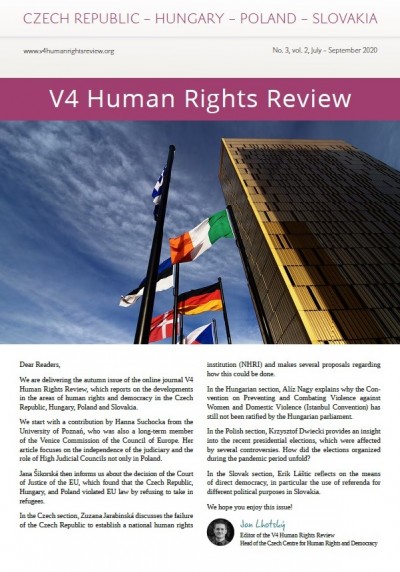You can download the spring V4 Human Rights Review here.
We are delivering the autumn issue of the online journal V4 Human Rights Review, which reports on the developments in the areas of human rights and democracy in the Czech Republic, Hungary, Poland and Slovakia.
We start with a contribution by Hanna Suchocka from the University of Poznań, who was also a long-term member of the Venice Commission of the Council of Europe. Her article focuses on the independence of the judiciary and the role of High Judicial Councils not only in Poland.
Jana Šikorská then informs us about the decision of the Court of Justice of the EU, which found that the Czech Republic, Hungary, and Poland violated EU law by refusing to take in refugees.
In the Czech section, Zuzana Jarabinská discusses the failure of the Czech Republic to establish a national human rights institution (NHRI) and makes several proposals regarding how this could be done.
In the Hungarian section, Alíz Nagy explains why the Convention on Preventing and Combating Violence against Women and Domestic Violence (Istanbul Convention) has still not been ratified by the Hungarian parliament.
In the Polish section, Krzysztof Dwiecki provides an insight into the recent presidential elections, which were affected by several controversies. How did the elections organized during the pandemic period unfold?
In the Slovak section, Erik Láštic reflects on the means of direct democracy, in particular the use of referenda for different political purposes in Slovakia.
We hope you enjoy this issue!
Content
- A growing or diminishing role of High Judicial Councils?
- Czech Republic, Hungary, and Poland violated EU law by refusing to take in refugees
Czech republic
- National Human Rights Institution in the Czech Republic: an unattainable dream or a potential reality?
- Home births: return to the middle ages or a path to human dignity?
- The COVID-19 pandemic in the Czech Republic
Hungary
- The Non-Ratification of the Istanbul Convention – Gender Inequality in Hungary
- Hungary’s newest trans-discriminatory measure
- Hungary’s new national curriculum faces criticism from several angles
Poland
- Elections that were not held: dispute over the organisation of the presidential elections in Poland
- Pandemic and freedom of assembly in Poland
- Poland must suspend the new Chamber of the Supreme Court created to handle disciplinary cases against judges
Slovakia
- The perils of direct democracy in Slovakia
- Embarking on the “Polish way”? - Amendments to abortion laws in Slovakia
- Office for Personal Data Protection and its politicization in Slovakia

